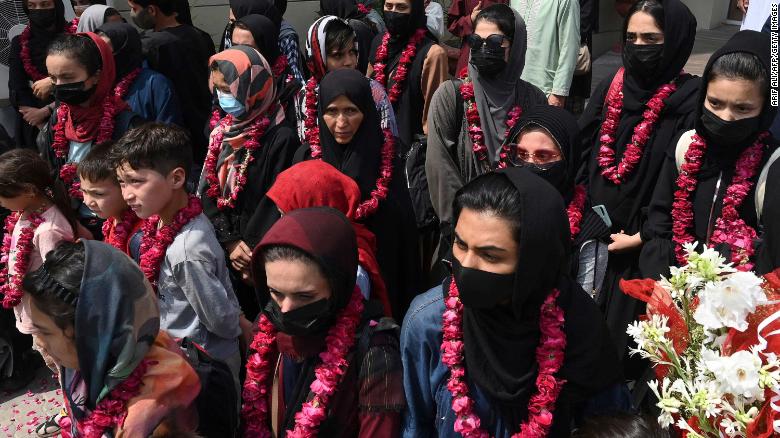Safe and alive, but ‘traumatized,’ the future of these Afghan women footballers is very uncertain

When the Taliban seized control in mid-August as the United States and Western allies withdrew their forces, women and girls were quickly instructed to stay home from work and school, and hundreds of the country’s athletes went into hiding or sought to be evacuated from the country fearing reprisals. During the last period of Taliban rule, women were banned from participating in sports, and by late August, Khalida Popal, the former captain of the Afghan women’s soccer team, had urged players to delete social media profiles and burn their kits to protect themselves. “They are like a nightmare for my generation. They took over all of our country in one night. And after that night, we were able to see the Taliban on the streets. They were cruel. They didn’t have mercy for anyone,” 19-year-old defender Narges Mayeli told CNN. Mayeli is one of two Afghan women footballers now living in the UK who spoke to CNN about their experiences. Once the Taliban seized power, the women feared for their lives and the safety of their families. An attempt to board an evacuation flight to Qatar failed in August following a suicide attack at Kabul airport, so the young women scrambled to leave Afghanistan overland, via Pakistan, through the Torkham border, in mid-September. They eventually secured a flight to the UK in November after two precarious months. “I have been receiving a lot of phone calls, messages, emails: people are desperate, especially the women athletes. They are really trying to just find a way to get out, to feel freedom, to get access to education,” Popal said. In October, CNN spoke to women in Kabul who were returning to public spaces after staying inside during the initial first few uncertain weeks of Taliban rule. Still, there has been concern about a steady rollback of women’s freedoms since the group seized power three months ago, most recently with women barred from appearing in television dramas. “We started playing football in a small area in a community where all of the people know us as football players. We were the women who were playing football, not only as a game, but we were playing football in order to empower other girls in order to raise our voices for women rights,” Mayeli told CNN. “As a woman, as a football player, I didn’t feel safe in Afghanistan.” An opportunity — but not “endgame” The young women say they are hopeful for their “bright futures” in the UK. Mayeli said she is thankful to all of the people who worked to help her reach the UK, including the UK government, Popal, ROKIT (a UK-based charity that has helped the footballers) and Kim Kardashian. “I want to have higher education, and help other people as I can. As I have abilities, I wanna raise my voice for other girls, because they’re still in Afghanistan and they are in danger,” she said. Popal told CNN that the girls need to be given refugee status, education support, mental health and financial support. “The main focus in the beginning is to get them mental health support, because they are traumatized. They need special care, and they have been on the go for such a long time now,” she said. “They have done their job. They have been through a lot, and they have risked their life to get out of Afghanistan. They have shown leadership. They have shown bravery. We need the community to come together to support the team to achieve their dreams and goals.” Nowrozi told CNN that she wants to become a child psychologist, as she studied psychology at university in Afghanistan. And the players can’t wait to carry on playing football. “To play for Chelsea, it’s my ambition.” “I love it, because when I’m playing football, I feel free. I feel relaxed. At first, it was a hobby, but after that it became my love,” she said.




